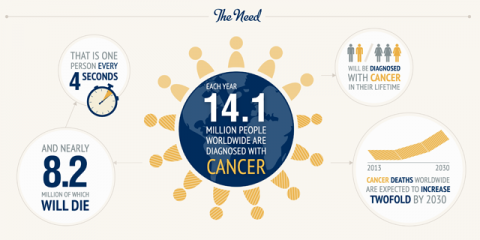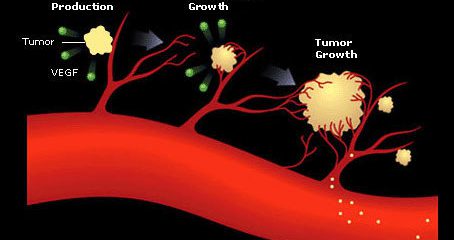In a nutshell This article reviews the causes and management of colorectal cancer. They specifically focus on improvements that have occurred in the last ten years. Some background Colorectal cancer (CRC) is the third most common cancer worldwide and the fourth leading cause of cancer-related deaths. Risk factors include age, family history of...
Read MoreColorectal cancer Posts on Medivizor
Cancer Immunotherapy: Infographic
The Cancer Research Institute has created an infographic to explain cancer immunotherapy. Cancer immunotherapy is an incredible resource to treat cancer. Essentially, the immune system is activated and its ability to remove specific cancer cells is re-enabled. The infographic below explains the components of the immune system that are...
Read MoreMargin call: Predicting margin involvement following surgical removal of rectal tumors
In a nutshell This study investigated risk factors for positive circumferential resection margins (CRM) in patients with cancer in the middle or lower rectum. Some background Locally advanced rectal cancer indicates that the cancer has spread beyond the lining of the rectum or has spread to the nearby lymph nodes. The main treatment for patients...
Read MoreA very aggressive surgery that may prolong survival for specific rectal cancer patients: extended sacropelvic resection
In a nutshell This study assessed the safety, feasibility, and cancer specific outcomes of extended sacropelvic resection (ESR) for locally recurrent (cancer that has returned at or near its original site) rectal cancer. Some background Despite improvements in treatment, local recurrence following surgery for rectal cancer remains a...
Read MoreMiR-31-5p: a tiny little messenger that could predict if treatment will benefit colorectal cancer patients
In a nutshell This study evaluated whether specific microRNA expression was predictive of anti-epidermal growth factor receptor (anti-EGFR) treatment success in patients with metastatic colorectal cancer (late stage cancer that has spread to distant sites). Some background MicroRNA’s are small messengers that help to regulate expression of...
Read MoreNew advances in radiotherapy may allow for improved treatment of colorectal cancer that has spread to lymph nodes
In a nutshell This article summarizes current information on the use of stereotactic body radiotherapy (SBRT) for recurrence of colorectal cancer to lymph nodes. Some background Colorectal cancer is a major health problem worldwide and is the third most common cause of cancer-related death globally. Although surgery, chemotherapy, and...
Read MoreMonitoring colorectal cancer survivors: What’s done currently and what’s next?
In a nutshell This article reviewed the current views on how best to monitor colorectal cancer survivors in order to detect return of cancer locally or at new sites as early as possible. Some background Over 1 million individuals develop colorectal cancer each year and 66% of these patients will be treated surgically with curative intent....
Read MoreEat to Beat Cancer? Just Wondering…
Thinking about Blood Blood carries nutrients and oxygen to the cells and waste products from the cells. Blood vessels—capillaries, arteries, veins—carry that blood throughout the body. Obviously blood vessels are important to life. The tissues in our body produce compounds that enhance the growth of blood vessels and that stop the growth of blood...
Read MoreNovel markers that predict the success of colorectal cancer drug therapy
In a nutshell This study evaluated whether microRNA expression was predictive of treatment success in patients with metastatic colorectal cancer (late stage cancer that has spread to distant sites). Some background MicroRNA’s are small messengers that help to regulate expression of genes. Recent studies have shown that dysregulation of...
Read MoreWhat is a CpG island methylator phenotype (CIMP) positive cancer and what does it mean for colorectal cancer patient survival?
In a nutshell This study examined the association between CIMP positive colorectal cancer and patient outcome. Some background Human DNA is made up of molecules known as nucleotides. Two of the nucleotides that make up DNA are known as cytosine and guanine. If these are located beside each other on DNA it is referred to as a CpG island. A process...
Read MoreNewer surgical method improves the outcome of patients with low rectal cancer
In a nutshell This study compared two surgical techniques in terms of short-term recovery and long-term outcome of low rectal cancer (tumor located in the lowest third of the rectum). Some background Surgery, or surgery combined with chemoradiatherapy or radiotherapy, is often the only curative option for patients with rectal cancer. The most...
Read MoreComparing surgical techniques: less invasive surgery reduces the interval between surgery and chemotherapy
In a nutshell This study investigated the effect of the surgical technique on the timing of chemotherapy administration. Some background Colon surgery (colectomy) is the main treatment for curing patients with colorectal cancer. There are 2 possible surgical techniques: laparoscopic surgery or open surgery. Laparoscopic surgery is a more recent,...
Read More











